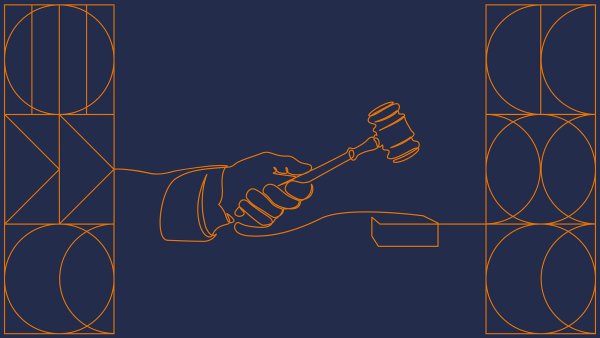
“As law students, you have heard a lot about the ‘rule of law,’” UVA School of Law Professors Charles Barzun and Josh Bowers told students last fall in their course “Rule of Law and Its Threats.” “But you’re future lawyers, you need to know more about what that means.”
“As lawyers, we don’t talk about it enough,” Barzun continued. “It’s like going to medical school without having a clear sense of what ‘health’ means.”
In other words, the rule of law may be a familiar phrase, but it’s a concept that’s often taken for granted, even in legal education. Understanding its meaning and implications is essential for not just lawyers, but for anyone concerned with the health of a constitutional democracy. The rule of law shapes how power is exercised, constrained, and held accountable, and it underpins the legitimacy of democratic institutions.

We recently asked Barzun to answer a few key questions about why the rule of law is so important to democracy—and why it is not easily defined.
Q: What exactly does the “rule of law” mean?
Barzun: One of the reasons we teach our class is that there is no simple answer to the question of what “rule of law” means. At its most basic level, it expresses the idea that people should be ruled by law and generally comply with it. But these days, people often use the phrase in a second, more specific sense, to refer to the idea that government power is exercised through laws and governmental actors should themselves be constrained by law.
That second meaning is foundational to a constitutional democracy. Indeed, it is virtually synonymous with the concept of a “legal order” or “constitutional order.”
The use of the term “rule of law” in that second sense is often traced to the British constitutional theorist A. V. Dicey (1835–1922). But some scholars have traced something like Dicey’s use of it to the 17th century.
Rule of law in this second sense goes beyond compliance with formal rules. A good example is prosecutorial discretion. Presidents have enormous authority over what gets prosecuted, and courts generally won’t interfere with that discretion. So, if an administration uses that discretion to target political enemies, it might be alarming, but not clearly illegal. That’s where norms—like impartiality and good faith—matter. And those aren’t enforceable by courts.
Q: What happens when those norms are ignored?
Barzun: That’s the troubling part. Much of our system depends not just on laws but on unwritten norms. If leaders stop following those norms, it’s hard to know what to do. Courts can play a role, but only up to a point. They only have as much power as people are willing to grant them.
That’s why I tell my students: the courts won’t save us. If we want to preserve the rule of law and constitutional democracy, it ultimately comes down to public vigilance and collective commitment to those core principles.
Q: How does freedom of the press relate to the rule of law?
Barzun: That’s a good question, and one we explore in class. Some theorists argue that rights like free speech and a free press are built into the rule of law itself, but that’s not the dominant view. Still, even if they’re not part of its formal definition, a functioning rule-of-law system likely depends on some level of free expression. Without a free press, it becomes much harder to hold officials accountable or know whether the law is being followed.
Q: Why is the rule of law important to democracy?
Barzun: Well, democracy can't exist without the rule of law in the first, more basic, sense I mentioned earlier: the idea that people should be ruled by law and generally comply with it. Democracy depends on a structured process, typically through elections or other forms of citizen participation, and the results of that process must be followed for the system to work. If there’s no recognition of, or respect for, the rules and principles that structure the system, democracy simply can’t function.
The rule of law in the larger sense of a “constitutional order” is actually a constraint on democracy. It means that even if the voting population elects a person to government with the hope that he or she will pursue some goal, that person is not authorized to pursue that goal if doing so would violate the Constitution or its laws. That’s the kind of tension a constitutional democracy has to navigate.